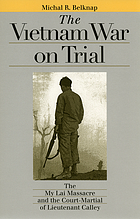
Any doubts that the war in Vietnam stalked US military strategy and tactics into the future were dismissed in 1991 when President George H. W. Bush declared, after victory in the first Persian Gulf War, “By God, we’ve kicked the Vietnam syndrome.” But that victory, Robert K. Brigham points out in his Is Iraq Another Vietnam?, was in fact due to the United States having altered military strategies because of the syndrome. Subsequently, he argues, the United States became bogged down Vietnam-like after the invasion of Iraq in 2003 because the syndrome (aka the lessons of Vietnam) was once again being neglected. Brigham’s book is organized around well-supported “yes” and “no” answers to the questions prompted by its title, making this an excellent book for undergraduate readers. Lloyd C. Gardner and Marilyn Young’s Iraq and the Lessons of Vietnam: Or, How Not to Learn from The Past is an edited volume with chapters written by accomplished academic and independent scholars in styles that are accessible to readers at all levels. The comparisons made between the two wars range widely, from the rationales constructed to justify US intervention in the respective cases to the geographic and cultural makeups of the two regions and the ideological and professional backgrounds of the policy makers. Richard Shultz’s The Secret War against Hanoi: Kennedy’s and Johnson’s Use of Spies, Saboteurs, and Covert Warriors in North Vietnam does not befit a “lessons” classification à la Brigham and Gardner/Young, but its exposure of the clandestine ingenuity (and nastiness) of US Special Operations against its Vietnamese enemies is unsurpassable as a foreshadowing of the off-the-books tactics employed in Iraq and Afghanistan that shocked the nation as their use became public.
By its title, Michal R. Belknap›s The Vietnam War on Trial: The My Lai Massacre and the Court Martial of Lieutenant Calley would seem to belong on the shelves with histories of the war. One chapter details the military operations that resulted in the massacre, but the book is primarily a history of the trial’s legal procedure, which pre-law students will find to be a valuable tune-up for the legal cases already generated by the wars in Iraq and Afghanistan. Belknap provides biographical sketches of the My Lai veterans and the key figures in the legal case, a thorough chronology that runs from the beginning of the war through the trial and the many appeals of Calley’s conviction, and an extensive bibliographic essay.
 The Vietnam War on trial: The My Lai Massacre and the court-martial of Lieutenant Calley by
The Vietnam War on trial: The My Lai Massacre and the court-martial of Lieutenant Calley by